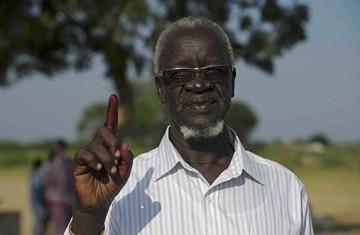South Sudan declines participation in Abyei meetings
August 21, 2017 (JUBA/KHARTOUM) – South Sudanese government said on Monday it declined to dispatch a team to Addis Ababa, Ethiopia, for an African Union-brokered meeting on the disputed area of Abyei, citing the lack of clear agenda.

A delegation from the from the African Union, United Nations and the UN Security Council was in Khartoum on 10 August to discuss the need for an agreement on Abyei joint administration and the implementation of the joint border patrols which should be supported by United Nations Interim Security Force for Abyei (UNISFA).
However, the head of the Sudanese side of the Abyei Joint Oversight Committee (AJOC) Hassan Ali Nimir Sunday disclosed the cancellation of the meeting, saying that the South Sudanese side didn’t travel to the meeting which had to take place in Addis Ababa.
Reached by Sudan Tribune to explain the position of his government over the meeting, South Sudanese Foreign Minister Deng Alor Kuol said their delegation could not take part in the meeting because of administrative and logistical issues.
“Our team could not travel because of few issues which needed to have been sorted out first. They are administrative and logistical matters,” he said on Monday
“Also the agenda of the meeting required the inputs from both parties. So there are now consultations between the parties through the African Union High-Level Implementation Panel,” further said Minister Kuol who is a native of the disputed area.
In Khartoum, Nimir said he was disappointed by the repeated absence of the South Sudanese side from the Abyei meetings, saying: “We hope that this is not the approach of the South Sudan committee because that will not lead to cooperation with each other”.
The Misseriya leading figure called on the South Sudanese side of AJOC and the Ngok Dinka leadership to own the process and take their decisions in an independent manner in order lay down the foundations of peaceful coexistence in the contested areas.
The South Sudan appointed Abyei Chief Administrator Kuol Alor Kuol told Sudan Tribune in a separate interview on Monday that the failure of the parties to establish an administration in the area, define the borders, and satisfy obligations related to security, the distribution of wealth, delivery of basic services, and the return of internally displaced persons (IDPs) and refugees was becoming a major concern. He further stressed that the Ngok Dinka are more interested in a referendum to determine the fate of the region.
“The concern now is that people are getting worried about the future of the area and they are asking us the leaders about what the two parties are doing, especially the conduct of the community referendum which clearly reflected the will of the people. They overwhelmingly voted in favour of returning to the South. This is in line with the provision of the CPA (Comprehensive Peace Agreement), said Kuol who is the AJOC co-chairman from the South Sudanese side.
“The international community should actually have recognized the result. But now it seems that there is a serious perception of disengagement by the international community on Abyei,” said Kuol.
He was referring to a unilateral referendum organised the Ngok Dinka community of Abyei in October 2013 without the participation of the Misseriya community and without the support of Khartoum and Juba0 Also, the international community didn’t recognise the outcome of the vote.
In a similar trend, Nyuol Paguot, the leader of one of the nine Ngok chiefdoms, told Sudan Tribune on Monday that local people reject the formation of joint administrative bodies in Abyei with the Sudanese Misseriya, citing lack of common grounds and past previous experiences.
“The African Union which has been handling the issue between the two parties should not ignore the view of the people of Abyei. If they really want the two countries to live in peace, they (The African Union and the international community) should recognise the outcome of the (unilateral) referendum,” said Paguot.
On 15 May, the 15-member body adopted resolution 2352, renewing the mandate of UNISFA until 15 November and to warned that it would withdraw its support for the joint border monitoring force if the two countries continue to refuse the formation of the joint border patrols.
The Sudanese side says ready for the implementation of the two measures, pointing an accusing figure at the South Sudanese sides saying they obstruct the joint administration and the implementation of the security arrangements agreed in September 2012.
The failure of the parties to agree on who is a resident of the disputed area and has the right the participate in the self-determination vote has prevented the organisation of a referendum on the permanent status of Abyei: remaining part of the Sudan or joining The South Sudan.
After several unsuccessful attempts, the international community feels that time is not opportune for a new initiative not only because of the positions of the two parties but also because of the civil war in the South Sudan.
The joint administration was seen as a temporary situation to ensure security and provide the local population with the needed services. However since the eruption of the South Sudanese crisis, many Ngok Dinka issue Sudanese ID cards and go to the West Kordofan schools and hospitals.
(ST)
